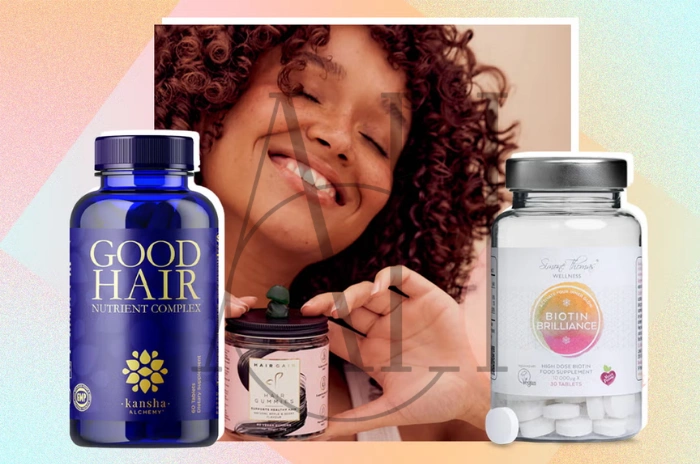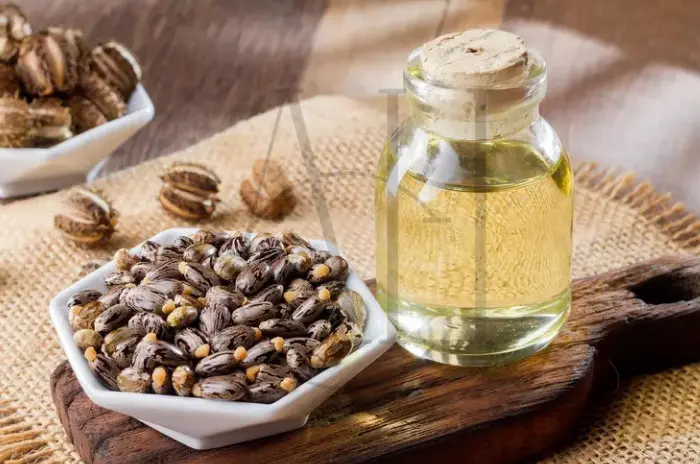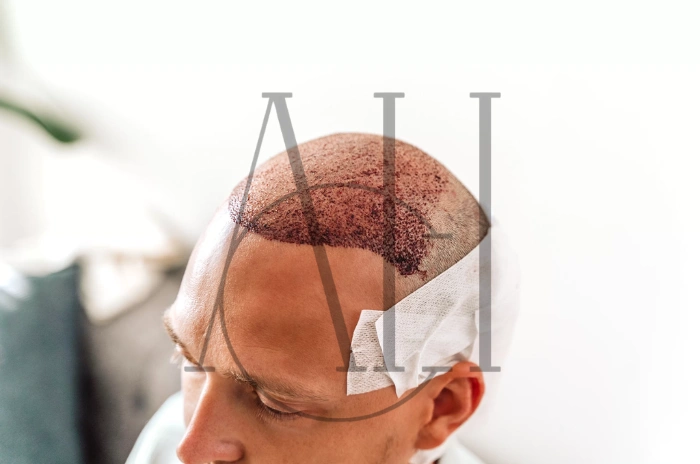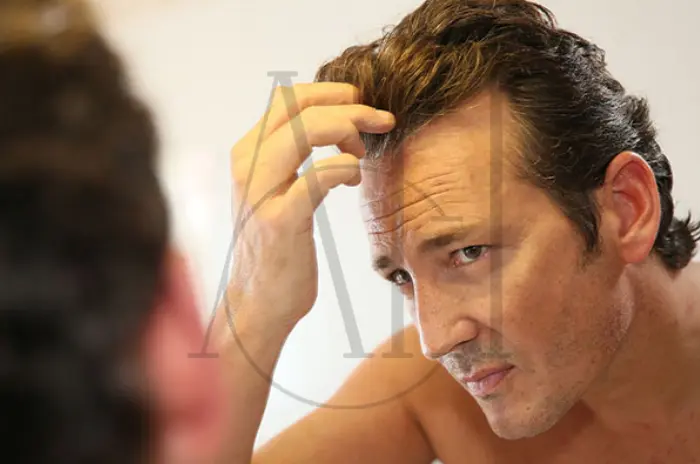Every woman dreams of having strong, lustrous hair that radiates health and vitality. However, factors like stress, hormonal changes, poor diet, and environmental damage can leave hair looking dull, thin, and brittle. The good news is that best hair vitamins can play a crucial role in supporting hair health from the inside out.
Hair vitamins for women have become increasingly popular as more people recognize the connection between nutrition and hair quality. These specialized supplements contain targeted nutrients that support the hair growth cycle, strengthen hair follicles, and promote overall scalp health. Understanding which vitamins work best and how they benefit your hair can help you make informed decisions about your hair care routine.
The journey to healthier hair often requires patience and consistency. Addressing nutritional deficiencies through hair growth vitamins offers a sustainable approach to achieving stronger, healthier hair.
Table of Contents
ToggleWhat Are Hair Vitamins, and How Do They Work?
Hair vitamins are dietary supplements specifically formulated to support hair health and growth. These products typically combine various nutrients, minerals, and botanical extracts that manufacturers claim can improve hair thickness, reduce shedding, and accelerate growth. The global hair supplement market has exploded in recent years, with countless brands promising to transform thin, brittle hair into thick, lustrous locks.
Most hair supplements for thinning hair work on the principle that nutritional deficiencies can contribute to hair problems. The theory suggests that by providing the body with optimal levels of hair-supporting nutrients, these supplements can address underlying deficiencies and promote healthier hair growth. However, the effectiveness of this approach depends heavily on whether an individual actually has nutritional deficiencies.
What hair vitamins do for women
Hair vitamins for women work by providing essential nutrients that support the complex process of hair growth and maintenance. Hair follicles are among the most metabolically active cells in the human body, requiring a steady supply of vitamins, minerals, and proteins to function optimally.
These supplements typically contain B-vitamins, particularly biotin for hair, which helps produce keratin. Vitamin C for hair protects follicles from oxidative stress while supporting collagen production that strengthens hair structure.
Iron for hair growth is particularly important for women, as iron deficiency is a leading cause of hair loss in females. Zinc for hair growth supports protein synthesis and cell division, both crucial for maintaining healthy hair growth.
Vitamin D for hair plays a role in creating new hair follicles, while selenium for hair and silica for hair strength protect against environmental damage and maintain hair elasticity.
Do hair vitamins actually work
The effectiveness of hair growth vitamins depends on several factors, including your current nutritional status, underlying health conditions, and genetic predisposition. For women with nutritional deficiencies, vitamins for hair loss can produce noticeable improvements in hair thickness, strength, and growth rate.
Research shows that deficiencies in nutrients like iron, biotin, and vitamin D directly impact hair health. When corrected through supplementation, many women experience reduced hair shedding and improved hair quality. However, do hair vitamins work for everyone? The answer is more nuanced.
If your hair issues stem from genetics, hormonal imbalances, or medical conditions, vitamins alone may not solve the problem. How long do hair vitamins take to work typically ranges from 3-6 months for significant improvements in hair length and thickness.
Best hair vitamins for faster growth
Achieving faster hair growth requires a comprehensive approach that includes the right combination of nutrients. Biotin for hair remains one of the most well-researched vitamins for promoting growth by helping metabolize amino acids that form keratin. Iron for hair growth is essential for women, especially those with heavy menstrual cycles or vegetarian diets.
Vitamin C for hair enhances iron absorption while supporting collagen synthesis. Zinc for hair growth regulates hormone levels that affect hair growth. Saw palmetto for hair loss has gained attention for potentially blocking DHT, a hormone that can shrink hair follicles.
Collagen for hair supplements provide amino acids that serve as building blocks for hair proteins, potentially beneficial for maintaining hair strength as natural collagen production decreases with age.
Best hair vitamins for hair loss and shedding
Hair loss and excessive shedding can be particularly distressing for women. Vitamins for hair loss work by addressing the root causes of follicle dysfunction and supporting the natural hair growth cycle. Understanding which nutrients target specific types of hair loss can help you choose the most effective supplements.
Vitamins for thinning hair often include B-vitamins, particularly B12, which supports red blood cell formation. Vitamin D for hair deficiency has been linked to alopecia areata and female pattern hair loss.
Iron for hair growth is crucial for women experiencing telogen effluvium, excessive shedding due to stress or nutritional deficiencies. Selenium for hair and zinc work together to support immune function and reduce inflammation. Saw palmetto for hair loss may help women with androgenetic alopecia by reducing DHT activity. Silica for hair strength helps maintain structural integrity, reducing breakage. Combined with collagen for hair supplements, silica can improve hair diameter.
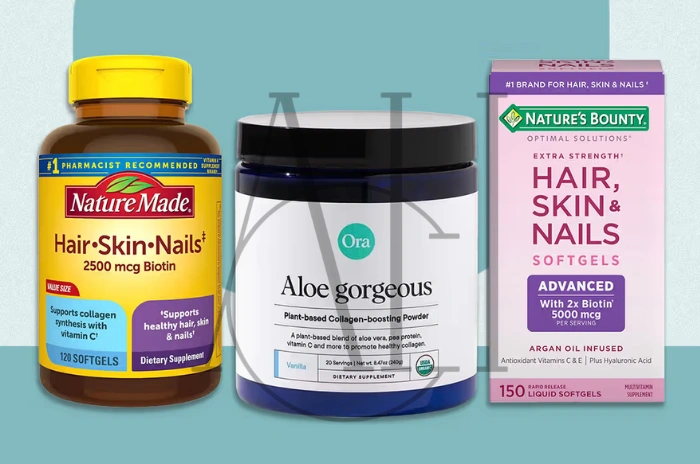
What Are the Best Hair Vitamins for Women
Choosing the best hair vitamins requires considering your individual needs, dietary restrictions, and specific hair concerns. Quality hair vitamin formulations contain clinically-studied doses of key nutrients. Look for supplements containing biotin for hair in doses ranging from 2,500 to 5,000 mcg daily. Iron for hair growth should be included if you have confirmed deficiency.
Vitamin C for hair is generally safe in doses up to 1,000 mg daily. Zinc for hair growth is effective in doses of 8-11 mg daily for women, while selenium for hair should not exceed 55 mcg daily.
Vegan hair vitamins are available for plant-based diets, featuring algae-derived nutrients and plant-based iron sources. Hair vitamins for thickness often combine DHT-blocking ingredients like saw palmetto for hair loss with growth-supporting nutrients.
Best Multivitamins for Hair, Skin, and Nails
Multivitamin formulations designed for hair, skin, and nails offer a convenient approach to comprehensive beauty nutrition. These best hair vitamins combinations recognize that healthy hair often reflects overall nutritional status and skin health.
Hair vitamins for women in multivitamin form typically include B-complex vitamins for energy metabolism. Biotin for hair is almost always included, alongside other B-vitamins that support cellular function.
Vitamin C for hair supports both collagen synthesis for skin elasticity and iron absorption for hair growth. Vitamin D for hair supports immune function and may help with seasonal hair changes.
Collagen for hair is increasingly included in comprehensive formulations, providing amino acids that benefit hair, skin, and nail structure. Silica for hair strength helps maintain structural integrity of all three beauty targets.
Quality hair vitamin multiformulations also consider nutrient interactions, ensuring that minerals like zinc for hair growth and iron for hair growth are balanced to prevent absorption interference. Selenium for hair is included in safe amounts that support antioxidant function without risking toxicity.
| Vitamin/Mineral | Daily Dosage for Women | Primary Hair Benefits | Food Sources |
|---|---|---|---|
| Biotin | 2,500-5,000 mcg | Keratin production, strengthens hair | Eggs, nuts, seeds |
| Iron | 18 mg (or as needed) | Oxygen transport to follicles | Red meat, spinach, beans |
| Vitamin C | 500-1,000 mg | Collagen synthesis, iron absorption | Citrus fruits, berries |
| Zinc | 8-11 mg | Protein synthesis, hormone balance | Oysters, pumpkin seeds |
| Vitamin D | 1,000-2,000 IU | Follicle creation and maintenance | Fatty fish, fortified foods |
| Selenium | 55 mcg | Antioxidant protection | Brazil nuts, seafood |
| Silica | 10-40 mg | Hair strength and elasticity | Bamboo extract, oats |
The Science Behind Hair Growth and Nutrition
Hair growth occurs in three distinct phases: anagen (growth), catagen (transition), and telogen (resting). During the anagen phase, which lasts 2-7 years, hair follicles actively produce new hair cells. The health of these follicles directly impacts hair quality and growth rate.
Nutritional factors play a crucial role in this process. Hair follicles are among the most metabolically active cells in the body, requiring a steady supply of nutrients to function optimally. When the body lacks essential vitamins or minerals, hair follicles may enter the telogen phase prematurely, leading to increased shedding and slower growth.
However, it’s important to understand that hair growth is also influenced by genetics, hormones, age, and environmental factors. Vitamin deficiency hair loss is real, but it represents just one piece of a complex puzzle. For individuals with adequate nutrition, additional supplementation may provide little to no benefit.
Essential Nutrients for Hair Health
Iron deficiency hair loss supplement research has consistently shown that low iron levels can contribute to hair loss, particularly in women. Iron is essential for hemoglobin production, which carries oxygen to hair follicles. Without adequate iron, follicles may receive insufficient oxygen, leading to premature entry into the telogen phase.
Vitamin D hair loss recovery is another area of active research. Vitamin D receptors are present in hair follicles, and deficiency has been linked to alopecia areata and other forms of hair loss. However, the optimal levels for hair health remain unclear, and excessive supplementation can be harmful.
Zinc deficiency can also impact hair health, as this mineral is involved in protein synthesis and cell division. However, zinc toxicity from over-supplementation can actually cause hair loss, highlighting the importance of balanced nutrition rather than megadoses.
Potential Side Effects of Hair Vitamins
While hair vitamins are generally marketed as safe and natural, they can cause adverse effects, particularly when taken in excessive doses. Understanding potential hair vitamin side effects is crucial for making informed decisions about supplementation.
The “more is better” mentality often leads people to exceed recommended dosages, assuming that higher doses will produce faster results. However, this approach can backfire, potentially causing the very problems the supplements are meant to solve.
Essential Minerals for Stronger Hair
Zinc: A Vital Mineral for Hair Follicles
Zinc for hair health is critical due to its role in protein synthesis, cell division, and tissue repair. This mineral is concentrated in hair follicles and supports the structural integrity of hair proteins.
Zinc deficiency can lead to hair loss, delayed wound healing, and impaired immune function. The mineral helps maintain the oil glands around hair follicles, supporting a healthy scalp environment.
Most people can meet their zinc needs through diet, but those with digestive disorders, vegetarians, and individuals under chronic stress may need supplements.
Omega-3 Fatty Acids and Scalp Health
The benefits of omega-3 fatty acids for hair include improving scalp circulation, reducing inflammation, and increasing hair shine. These essential fatty acids for hair cannot be produced by the body and must be obtained through diet or supplements.
EPA and DHA, found primarily in fish oil, support healthy cell membranes and may help extend the anagen phase of hair growth. These fatty acids also have anti-inflammatory properties that can benefit scalp health.
Omega-3 fatty acids help maintain scalp moisture and may reduce dry, flaky conditions that can interfere with healthy hair growth.
Iron Deficiency and Hair Loss
Iron plays multiple roles in hair health beyond oxygen transport. This mineral is involved in collagen synthesis, which provides structural support for hair follicles.
Women are particularly susceptible to iron deficiency due to menstruation, pregnancy, and breastfeeding. Vegetarians and vegans may also have difficulty maintaining adequate iron levels from plant sources alone.
Testing ferritin levels, rather than just hemoglobin, provides a better assessment of iron stores related to hair health.
Vitamin D and Its Role in Hair Health
The impact of vitamin D on hair follicle health includes regulating the hair cycle and supporting keratinocyte proliferation. Vitamin D receptors are found in all hair follicles.
Research shows that people with alopecia areata often have lower vitamin D levels than those without hair loss. Supplementation may help support hair regrowth in individuals with deficiency.
Sun exposure, fortified foods, and supplements are the main sources of vitamin D, with many people requiring supplements to maintain optimal levels.
Biotin and Other B-Complex Vitamins
The role of biotin in hair growth and strength includes its function as a cofactor in fatty acid synthesis and amino acid metabolism. Biotin deficiency, while rare, can cause significant hair loss.
Biotin for hair health is popular, although true deficiency is uncommon in healthy individuals eating varied diets. However, certain conditions and medications can affect biotin status.
Other B vitamins, including B6, B12, and folate, support various aspects of hair health through their roles in protein metabolism and red blood cell formation.
Amino Acids and Proteins for Stronger Hair
Protein Deficiency as a Cause of Hair Loss
Protein deficiency as a cause of hair loss can occur even in developed countries, particularly in individuals following extreme diets or having eating disorders. Hair follicles prioritize survival functions over cosmetic concerns when protein is scarce.
Kwashiorkor, a severe form of protein malnutrition, causes characteristic hair changes including loss of pigmentation and texture changes. Milder protein deficiency can cause diffuse hair thinning.
Adequate protein intake should include 0.8-1.2 grams per kilogram of body weight daily, with higher requirements for athletes and stressed individuals.
Essential Amino Acids for Hair Structure
Essential amino acids for hair structure cannot be produced by the body and must be obtained through diet. Cysteine, methionine, and lysine are particularly important for hair protein synthesis.
Amino acids for hair growth work together to build keratin, the primary structural protein in hair. Deficiency of any essential amino acid can limit protein synthesis and affect hair quality.
Sulfur-containing amino acids like cysteine and methionine are particularly important for hair strength and structure.
How Long Before You See Results from Supplements
How long before you see results from supplements depends on the severity of deficiency, individual metabolism, and specific nutrients involved. Most people begin to notice improvements in hair quality within 6-12 weeks.
Significant changes in hair density and growth rate typically require 3-6 months of consistent supplementation. Hair growth is naturally slow, with average rates of 0.5 inches per month.
Realistic expectations are important for maintaining compliance with the supplementation regimen.
When to Use Hair Growth Supplements
Blood Tests Can Show Nutrient Gaps
Blood tests can show nutrient gaps that may contribute to hair loss, allowing for targeted supplementation rather than general multivitamin approaches.
Common tests include complete blood count, comprehensive metabolic panel, ferritin, vitamin D, B12, and thyroid function tests. These can identify specific deficiencies affecting hair health.
Regular monitoring helps track progress and adjust supplementation as needed.
FAQ :Best Hair Vitamins for Women for Stronger Healthier Hair
Do hair growth vitamins really work for women?
Hair growth vitamins can be effective for women with nutritional deficiencies, but results vary based on individual factors like genetics and overall health status.
What specific vitamins are best for hair loss?
Biotin for hair, iron for hair growth, vitamin D for hair, and zinc for hair growth are among the most effective nutrients for addressing various types of hair loss in women.
Are there any side effects from hair vitamins?
Most hair vitamins for women are well-tolerated, but high doses of certain nutrients like biotin may cause skin breakouts, while excess iron can cause digestive upset.
Can a multivitamin improve the health of hair?
A quality hair vitamin multivitamin can support hair health by addressing multiple nutritional needs simultaneously, especially beneficial for women with busy lifestyles or dietary restrictions.

